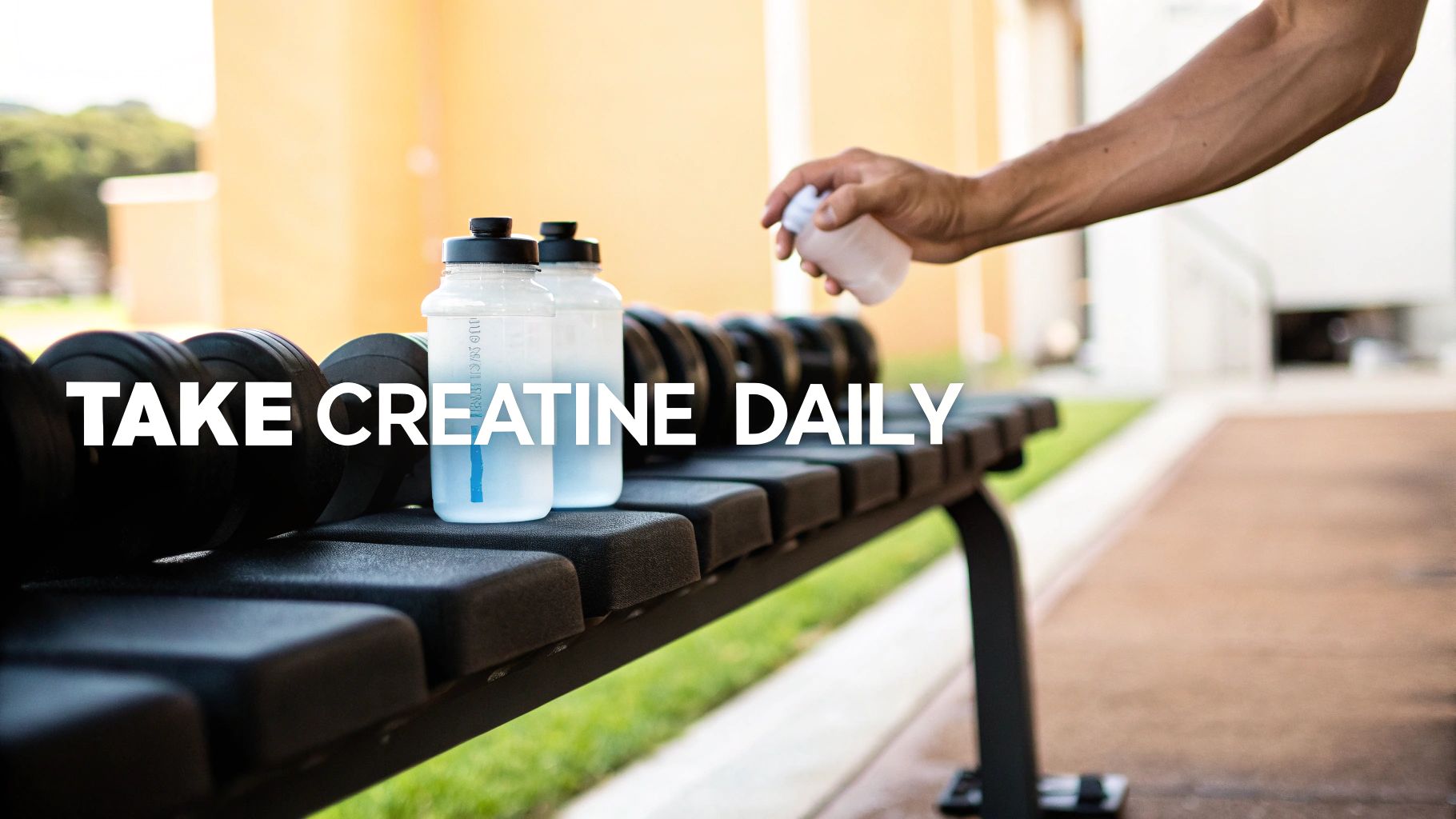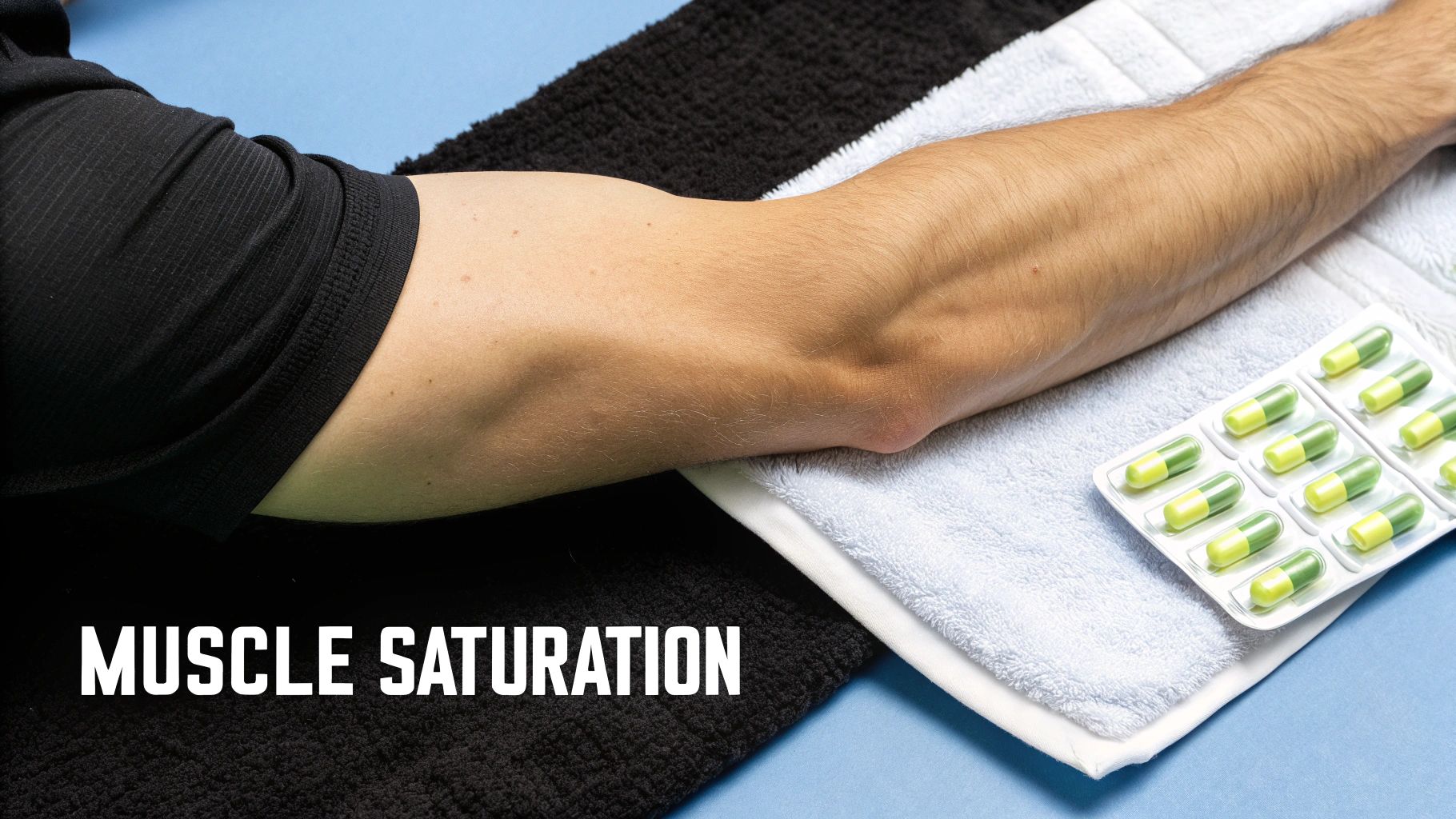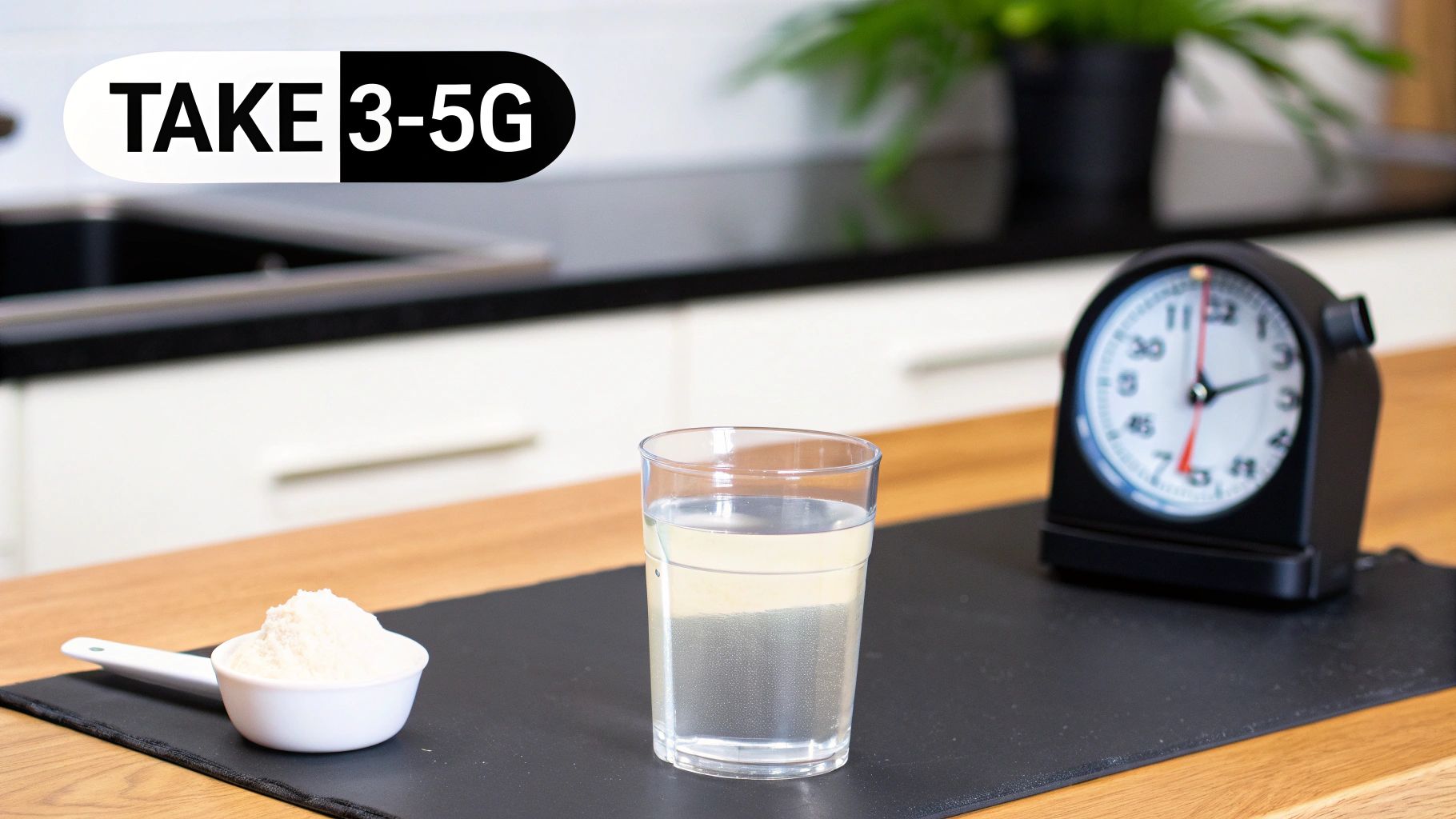
Should I Take Creatine on Rest Days?
Share
So, should you take creatine on your days off from the gym? The short answer is a resounding yes. The real magic of creatine doesn't come from timing it perfectly before a workout, but from consistent, daily use.
Think of it like this: your muscles have a creatine "gas tank." The goal is to fill that tank to the brim and keep it there, so you always have high-octane fuel ready for your next training session. Taking it on rest days is just topping off the tank.
Why Daily Creatine Intake Matters

The whole point of taking creatine is to achieve and maintain what’s called muscle saturation. This is the sweet spot where your muscle cells are fully loaded with creatine, giving them the energy reserves needed for explosive power and faster recovery.
And remember, your muscles don't just shut down on rest days. That's when the real work of repairing and rebuilding happens. By keeping your creatine levels high, you're giving your body a crucial tool to support that growth and recovery process around the clock.
Consistency Is The Key To Creatine Success
This is why a steady, daily dose is non-negotiable. Once you're past the initial loading phase (if you chose to do one), the standard maintenance dose of 3-5 grams per day is all you need to keep those muscle stores topped up.
If you start skipping days, those carefully built-up creatine levels will slowly begin to drop, and with them, the performance benefits you've been enjoying. It's a simple principle that's backed by science, as highlighted in this detailed research on supplementation strategies.
The most important takeaway is simple: consistency wins. Taking your daily dose keeps your muscles saturated, supporting continuous repair and growth so you're ready for your next session.
Here's a quick breakdown to simplify the concept:
Why Daily Creatine Intake Matters
A quick look at the goals and recommended dosage for training and rest days to maintain peak muscle saturation.
| Day Type | Primary Goal of Intake | Recommended Dose |
|---|---|---|
| Training Day | Replenish creatine used during the workout and support recovery | 3-5 grams |
| Rest Day | Maintain muscle saturation and support ongoing repair | 3-5 grams |
As you can see, the strategy doesn't change just because you aren't lifting.
This daily habit ensures your body always has what it needs, whether you're pushing your limits or letting your muscles heal. To get a deeper understanding of the science, check out our guide on what creatine does for your body. Ultimately, making creatine a part of your daily routine—rest days included—is the only way to get the most out of it.
How Creatine Fuels Your Muscles

Before we can really get into why taking creatine on rest days is so important, we need to quickly look at what's happening inside your muscles. Think of it this way: your muscle cells run on tiny, rechargeable batteries that power every single explosive movement you make, whether you're deadlifting or just sprinting up a flight of stairs.
The energy currency your body uses is a molecule called Adenosine Triphosphate (ATP). When you go all-out in the gym, your muscles chew through your ATP supply like there's no tomorrow, draining those cellular batteries. That rapid energy drain is the very reason you can only hit a few heavy reps before your strength gives out.
This is where creatine steps in. It's not the fuel itself, but rather the rapid-recharging system that gets your batteries back to full power, and fast.
The ATP Recharge Cycle
Inside your muscles, creatine is stored mostly as phosphocreatine. When you use ATP for energy, it loses a phosphate group and becomes Adenosine Diphosphate (ADP)—essentially a dead battery that can't do any more work.
This is phosphocreatine's moment to shine. It swoops in and generously donates its own phosphate group to that "dead" ADP molecule, instantly recycling it back into a fully charged, ready-to-use ATP molecule. This is your body's number one method for regenerating energy for those short, intense bursts of power.
By supplementing with creatine, you're not just adding more fuel; you're building a bigger, more efficient energy-recycling plant right inside your muscles. This lets you push harder and for longer than you could before.
Understanding this cycle is key. When your creatine stores are consistently topped off, this entire energy-regeneration process runs like a well-oiled machine.
Why This Matters for Rest Days
Just because you're not in the gym doesn't mean your muscles are off the clock. Your rest days are when the real magic happens—repair and growth. And guess what? Those processes require a ton of energy.
Keeping your creatine levels topped up ensures your muscle cells have all the ATP they need to rebuild and recover effectively.
If you skip a dose, you're letting those reserves dip. This can slow down the recovery cycle and mean you're walking into your next workout with a tank that isn't quite full. So, when people ask, "should I take creatine on rest days," the answer is a resounding "yes." It's all about keeping your muscles primed and ready for whatever you throw at them, whether that's intense work or active recovery.
The Importance of Consistent Muscle Saturation

This brings us to the whole point of using creatine effectively: achieving muscle saturation. Think of it as getting your muscle cells fully stocked with creatine, so they're primed and ready to unleash that burst of energy right when you need it.
But getting to that "full tank" state isn't a one-and-done deal. It actually takes several weeks of consistent, daily intake to max out your muscles' creatine stores. When you skip a dose, even just on a rest day, you're essentially letting a slow leak develop in that tank. You never quite reach 100%.
Remember, your muscles don't just shut off when you're not in the gym. Rest days are when the real magic happens—they're in a crucial recovery mode, busy repairing and rebuilding themselves to be stronger. And that entire process runs on cellular energy.
Keeping Your Muscles Primed for Growth
Here's a simple way to look at it: taking creatine is like watering a plant. You get healthy growth from consistent, daily watering, not from flooding it only on the days it looks a bit droopy. Taking creatine on your off days makes sure your muscles have all the resources they need for that nonstop repair and growth cycle.
This daily habit is what keeps your muscles in an ideal state, setting you up for better performance in your next workout and supporting your long-term recovery.
Skipping doses, even on rest days, is like letting a slow leak drain your reserves. Maintaining high creatine levels during this time supports the crucial process of muscle repair and rebuilding.
This isn't just bro-science; it's backed by a mountain of research. Keeping your creatine levels topped off helps pull more water into your muscle cells (intracellular hydration), creating a better anabolic environment for them to grow. This holds true even on the days you don't train. To dive deeper into the science, you can read a comprehensive review on creatine’s effects.
If you're just starting out, understanding the science behind a loading phase for creatine monohydrate can help you get to that saturation point faster. But the main takeaway is this: once you're there, consistency is everything. This daily commitment is precisely why the answer to "should I take creatine on rest days" is a resounding yes.
So, What's the Real Point of Taking Creatine on Rest Days?
https://www.youtube.com/embed/PD8-CJ6OuAQ
It’s a fair question. If you’re not hitting the gym, why bother with creatine? The truth is, taking it on your days off isn't just about maintaining a habit—it’s an active strategy that keeps your body primed for growth and recovery.
The main reason is to keep your muscles fully saturated. Think of your muscles like a sponge. On training days, you're "soaking" them with creatine. Taking a maintenance dose on rest days ensures that sponge stays full, so it never has a chance to dry out. This consistency is crucial for enhanced muscle recovery. By keeping your creatine stores topped off, you’re helping your body reduce muscle cell damage and inflammation, which often means less soreness and a better start to your next workout.
But it doesn't stop there. Consistent dosing is also key for muscle hydration. Creatine pulls water into your muscle cells, and this isn't just for a temporary "pump." That cellular swelling actually signals your body to ramp up protein synthesis—the very process that builds new muscle.
It’s Not Just About Your Biceps
Here's something a lot of people overlook: your brain is a massive energy hog, and it uses creatine for fuel, too. Keeping your levels stable supports cognitive functions like mental clarity and focus. So while your body is repairing, you're also giving your mind the resources it needs to stay sharp.
A steady supply of creatine ensures your muscles and your brain are always ready for action. It turns your rest days from simple downtime into truly productive recovery periods.
This isn't just theory. We're seeing more and more research showing that the cognitive boosts from creatine only kick in with consistent, long-term use. For instance, studies have found that brain creatine levels only increase after weeks of daily dosing. Sporadic intake just doesn't cut it. If you're interested in the nitty-gritty, you can dig into some of the recent scientific literature on creatine's effect on the brain.
When you boil it down, sticking with creatine on your off days gives you a clear edge:
- Faster Recovery: Bounce back quicker with less muscle soreness.
- Better Muscle Growth: Keep your muscles in an ideal state for building new tissue.
- Consistent Cognitive Support: Fuel your brain, not just your body.
It’s a simple habit that pays off in more ways than one.
Your Simple Creatine Dosing and Timing Guide

Let's cut through the noise and make this easy. For nearly everyone, the sweet spot for creatine is a daily dose of 3-5 grams. This isn't just for workout days; it's an every-single-day commitment to keep your muscles topped off. Think of it like watering a plant—consistency is what makes it thrive.
One of the biggest questions I hear is, "When should I take it on my rest days?" The truth is, it really doesn't matter. The main goal is simply to get that daily dose in at some point to maintain those fully saturated creatine stores we talked about earlier.
Finding Your Perfect Timing
Don't overthink this part. The best time to take creatine is whenever you're most likely to remember it. The key is building a habit.
- Morning Routine: A lot of people find it easiest to just mix it into their morning coffee, tea, or a glass of water right when they wake up.
- With a Meal: Tossing it into a protein shake or smoothie with breakfast or lunch is another foolproof method.
- Anytime: Honestly, just down it with some water whenever works for you. Set a reminder on your phone if you have to!
While some people love to debate the minor advantages of pre- vs. post-workout timing, those are really just small details in the grand scheme of things. If you're curious about optimizing every last percentage point, you can dig into the specifics of when to take creatine for best results. For the rest of us, just getting it in daily is the win.
Don't get lost in the weeds. The most effective creatine routine is the one you stick with. Just make taking it as automatic as brushing your teeth.
If you're looking to keep a closer eye on your overall intake, including supplements, using one of the many nutrition tracking apps can be a game-changer. But at the end of the day, just focus on making that 3-5 gram dose a non-negotiable part of your daily routine.
Got Questions About Creatine? Let's Clear Them Up
Sticking with a new supplement can bring up a lot of questions, especially when it comes to daily habits. It's totally normal to wonder if you're doing things right.
Let's walk through some of the most common questions about creatine so you can feel confident in your routine and focus on what really matters—crushing your workouts.
What Happens If I Forget to Take Creatine on a Rest Day?
First off, don't sweat it. Missing a single dose isn't going to torpedo your progress. Your creatine levels drop off very slowly, so one forgotten scoop won't suddenly empty your muscles' reserves.
Just get back on your regular schedule the next day with your usual 3-5 gram dose. There’s absolutely no need to double up to "catch up." The real magic of creatine lies in consistency over time, not in being perfect every single day.
The key is consistency over perfection. Missing one dose is a minor blip on the radar. Just continue with your regular schedule the following day to keep your muscle stores topped off.
Should I Take a Lower Dose on Rest Days?
Nope, keep it consistent. You should stick with the same maintenance dose on your off days as you do on training days. The whole point is to keep your muscle creatine stores completely full, and a steady daily intake is the simplest, most effective way to do that.
Even when you're not in the gym, your body is still using creatine for recovery and other background processes. Maintaining your dose ensures your muscles are always primed and ready for your next workout. Lowering it would be like siphoning a little gas out of your tank—it just doesn't make sense.
For anyone serious about maximizing their results, it's helpful to see how creatine works alongside the best supplements for bodybuilding to create a powerful, well-rounded strategy.
Do I Need to Cycle Off Creatine?
The short answer is no. For most healthy people, there’s no need to cycle off creatine. This is one of the most well-researched supplements on the planet, and study after study has confirmed it's safe for long-term, continuous use.
The old-school advice to cycle creatine came from a theory that your body might stop making its own. We now know that's not how it works. Research shows that if you do decide to stop taking it, your body’s natural production kicks right back into gear. If you want to keep reaping the benefits for performance and recovery, sticking with it daily is the way to go.